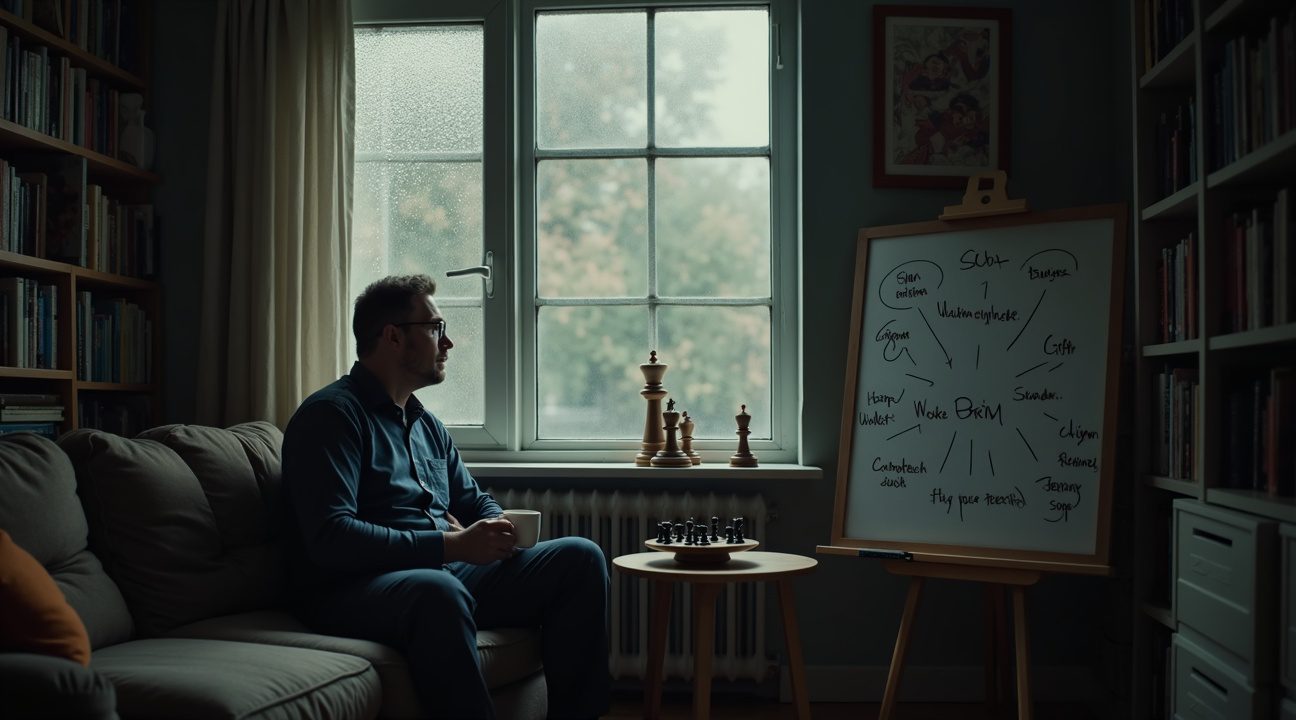Longitudinal research reveals an unexpected trend: men with high verbal intelligence have only a 0.17 probability of getting married within six years, challenging the widespread assumption that intelligence enhances romantic success.
Key Takeaways
- Highly verbally intelligent men exhibit significantly lower marriage rates—with only a 0.17 probability of marrying within six years—when compared to their less verbally skilled peers.
- Many individuals overestimate their partner’s intelligence by an average of 36 to 38 IQ points. This discrepancy fosters unrealistic relationship expectations and performance pressure.
- Intelligence compatibility doesn’t ensure relationship satisfaction; instead, emotional intelligence, mutual values, and communication abilities are stronger predictors of marital happiness.
- Intelligent men often prefer smaller social circles and solitary activities. Their analytical demeanor can sometimes contrast with the spontaneity typically associated with romance.
- Disparities between perceived and actual intelligence contribute to social friction, leaving intelligent men feeling obligated to meet high cognitive expectations rather than developing emotional intimacy.
Further Reading and Insight
To delve deeper into the effects of intelligence on relationships, [this article by Psychology Today](https://www.psychologytoday.com/) explores how traits like analytical thinking may hinder rather than help in romantic pursuits.
Why Highly Verbal Intelligent Men Have a 0.17 Probability of Marriage Within Six Years
Longitudinal research reveals a striking pattern that challenges conventional wisdom about intelligence and romantic success. Men who score high in verbal intelligence face a marriage probability of just 0.17 within six years—a significantly lower rate compared to their less verbally gifted counterparts. This data suggests that exceptional verbal abilities, rather than enhancing romantic prospects, may actually create barriers to long-term relationship formation.
The numbers tell a compelling story. While society often assumes that attractive and intelligent men have better dating prospects, the reality proves more complex. Highly verbally intelligent men don’t just marry later—they marry less frequently overall. This pattern indicates that the relationship between cognitive ability and romantic success isn’t the straightforward correlation many expect.
The Paradox of Perceived Desirability
Intelligence creates an interesting paradox in modern dating. On paper, these men often appear highly desirable with impressive educational credentials, articulate communication skills, and professional success. However, the low marriage probability suggests that real-world romantic dynamics operate differently than theoretical attractiveness. Women might initially find verbal intelligence appealing, but other factors ultimately influence long-term commitment decisions.
Several social dynamics contribute to this phenomenon:
- Highly verbal men often overthink romantic situations, analyzing conversations and interactions to the point where spontaneity disappears.
- They may struggle with emotional intelligence despite their verbal prowess, finding it difficult to read non-verbal cues or respond appropriately to their partner’s emotional needs.
- Their analytical nature can make them appear distant or overly critical, traits that don’t foster intimate connections.
The data also suggests these men might have unrealistic standards or expectations. Their verbal intelligence allows them to articulate precisely what they want in a partner, potentially creating impossibly detailed criteria that few real people can meet. This perfectionist tendency can lead to endless searching rather than committed relationships.
Career demands often compound these challenges. Highly verbal intelligent men frequently pursue demanding professional paths that require significant time investment. This focus on achievement can leave little energy for developing meaningful relationships or may attract partners more interested in their status than genuine connection.
The findings highlight how social skills and emotional intelligence matter more in relationship formation than pure cognitive ability. While verbal intelligence opens many doors professionally, it doesn’t guarantee romantic success. Understanding these patterns can help highly intelligent men recognize potential blind spots and develop more effective approaches to dating and relationship building.

The Hidden Reason We Overestimate Our Partner’s Intelligence by Nearly 40 IQ Points
Love appears to make us terrible judges of intelligence. Research reveals a fascinating cognitive bias that affects how couples perceive each other’s intellectual abilities, with women overestimating their partner’s IQ by approximately 38 points and men doing so by about 36 points compared to objective IQ measures.
This dramatic overestimation creates a significant perception gap between reality and romantic idealization. People consistently rate their romantic partners as more intelligent than they actually are, often exceeding even the generous estimates they make about their own cognitive abilities. The phenomenon suggests that attraction and emotional connection cloud our ability to accurately assess intellectual capacity.
Why Intelligence Perception Becomes Distorted in Relationships
Several psychological mechanisms contribute to this widespread overestimation:
- The halo effect: Positive feelings about a partner influence perceptions of their other qualities, including intelligence. When someone feels attracted to another person, they’re more likely to interpret average comments as insightful or mistake confidence for competence.
- Confirmation bias: Partners actively seek evidence that supports their belief in their loved one’s intelligence while dismissing or reframing contradictory information. A simple observation might be elevated to profound wisdom, while intellectual mistakes get rationalized away.
The Impact on Relationship Dynamics and Attraction
This substantial overestimation creates several relationship challenges that particularly affect highly intelligent individuals. When expectations don’t align with reality, disappointment often follows. Partners may feel pressure to live up to inflated intellectual standards, leading to anxiety and performance concerns in conversations.
The bias also makes it harder to establish genuine intellectual connections. If someone can’t accurately gauge their partner’s cognitive abilities, they might engage at inappropriate intellectual levels, either talking down to someone capable of deeper discourse or overwhelming someone with concepts beyond their comfort zone. This misalignment can prevent the authentic intellectual intimacy that many smart individuals crave.
For intelligent men specifically, this phenomenon creates additional complications in dating. They might struggle to find partners who can accurately assess and appreciate their intellectual capacity without the distortion of romantic bias. The early dating phase becomes particularly challenging when both parties operate under false assumptions about intellectual compatibility.
Understanding this cognitive bias helps explain why many relationships fail to meet intellectual expectations. Recognition of this tendency allows individuals to approach partner evaluation more objectively, potentially leading to more satisfying long-term intellectual partnerships. Smart individuals who understand this bias can work to see past romantic idealization and focus on genuine intellectual compatibility rather than inflated perceptions.

Why People Choose Partners with Similar Intelligence Despite Overestimating Their IQ
Research reveals a fascinating pattern in how people select romantic partners: they consistently gravitate toward individuals who match their own intellectual capacity, a phenomenon known as assortative mating. This tendency persists even when people aren’t entirely accurate about their partner’s actual intelligence level.
The Science Behind Intellectual Compatibility
Scientists have discovered compelling evidence for intellectual compatibility in romantic relationships. In a comprehensive study of 218 heterosexual couples, researchers found a positive correlation between partners’ objective IQ scores. This suggests that people naturally seek out partners who share similar cognitive abilities, creating what psychologists call intellectual homogamy.
Assortative mating for intelligence appears to be an unconscious process that operates across different demographics and relationship types. Couples tend to match on cognitive abilities even when they haven’t explicitly discussed intelligence or educational backgrounds during their courtship. This pattern emerges regardless of whether the relationship began through traditional dating methods or more modern approaches.
Gender Differences in Intelligence Assessment Debunked
Contrary to popular evolutionary theories suggesting that women possess superior abilities to assess male intelligence, recent research paints a different picture. Both men and women demonstrate remarkably similar tendencies and accuracy levels when estimating their partner’s IQ. This finding challenges long-held assumptions about sex differences in mate selection strategies.
The research shows no significant variations between genders in their ability to accurately predict a partner’s intelligence. Men and women both tend to overestimate their partner’s cognitive abilities to some degree, yet they still manage to select partners with compatible intelligence levels. This suggests that mate selection for intellectual compatibility operates through mechanisms beyond conscious assessment.
Intelligence discernment appears to function through subtle behavioral cues and communication patterns rather than explicit evaluation. Partners might recognize cognitive compatibility through conversation quality, humor appreciation, or problem-solving approaches without consciously measuring IQ levels. These unconscious assessments contribute to the strong correlation found between partners’ actual intelligence scores.
The tendency toward intellectual matching helps explain why highly intelligent individuals might struggle with dating. Their smaller pool of cognitively compatible partners naturally limits their options, potentially making it more challenging to find suitable matches. Understanding this pattern can help people recognize that being single at certain life stages might reflect preference standards rather than personal shortcomings.
The Surprising Truth About IQ Compatibility and Relationship Happiness
I’ve discovered something fascinating that challenges conventional wisdom about intelligence and romantic relationships. Research reveals there’s no clear correlation between IQ compatibility and relationship satisfaction—couples with similar intelligence levels don’t report significantly higher happiness in their partnerships. This finding turns popular assumptions about intellectual matching on their head.
Many people assume that finding someone on their intellectual wavelength guarantees a successful relationship. They believe shared cognitive abilities create stronger bonds and deeper understanding between partners. However, scientific evidence doesn’t support this belief. Couples who score similarly on intelligence tests don’t experience markedly better relationship satisfaction compared to those with different IQ levels.
The data suggests that intellectual compatibility operates differently than most people expect. While individuals naturally gravitate toward partners with similar intelligence levels—a phenomenon psychologists call assortative mating—this matching doesn’t translate into relationship success. Smart people often seek equally intelligent partners, yet these pairings don’t consistently produce happier marriages or more stable unions.
What Really Matters for Relationship Success
Several factors prove more influential for marital happiness than IQ compatibility:
- Emotional intelligence and empathy levels between partners
- Shared values and life goals that align with both individuals’ priorities
- Communication skills that allow effective conflict resolution
- Mutual respect and appreciation for each other’s unique qualities
- Compatible attachment styles and emotional needs
- Physical attraction and romantic chemistry that sustains over time
Intelligence alone can’t carry a relationship. I’ve observed that highly intelligent individuals sometimes struggle with emotional connections, focusing too heavily on logical compatibility while neglecting emotional intimacy. They might analyze their relationships like academic problems rather than nurturing the emotional bonds that create lasting satisfaction.
The research indicates that relationship satisfaction depends more on how partners handle emotions, communicate during disagreements, and support each other through challenges. A couple where one person has a significantly higher IQ might thrive if they possess strong emotional intelligence and communication skills. Conversely, two equally brilliant individuals might struggle if they lack empathy or can’t resolve conflicts effectively.
Intelligence differences can actually benefit relationships in unexpected ways. Partners with varying cognitive strengths often complement each other, bringing different perspectives and problem-solving approaches to their partnership. One person might excel at analytical thinking while their partner demonstrates superior social intelligence or creative abilities. These differences can enrich the relationship rather than creating barriers.
The tendency for intelligent people to seek similar partners might even work against them. When highly analytical individuals focus primarily on intellectual compatibility, they might overlook partners who could offer emotional fulfillment and practical support. This narrow focus can limit their dating pool unnecessarily, especially considering that embracing life and more often requires openness to diverse types of connections.
Research also shows that people overestimate the importance of shared intelligence in their relationships. They believe intellectual matching matters more than it actually does for day-to-day relationship dynamics. Daily interactions depend more on kindness, humor, reliability, and emotional support than on solving complex problems together or engaging in intellectual debates.
Some studies suggest that extreme intelligence differences might create communication challenges, but moderate differences rarely impact relationship satisfaction. Partners don’t need identical IQs to understand each other or share meaningful conversations. They need patience, genuine interest in each other’s thoughts, and willingness to communicate at levels that work for both people.
The pressure to find an intellectually equal partner can create unrealistic expectations that sabotage potentially fulfilling relationships. Smart individuals might dismiss compatible partners based solely on perceived intelligence differences, missing opportunities for genuine connection. Meanwhile, they might pursue relationships with intellectual equals that lack emotional chemistry or shared values.
Understanding these research findings can help intelligent people approach dating more effectively. Rather than prioritizing IQ compatibility above all else, they can focus on finding partners who demonstrate emotional maturity, share important values, and communicate well. These qualities predict relationship success far better than matching intelligence scores ever could.
What Makes Intelligent Men Struggle More in Romance Than Expected
Intelligent men often face a paradox in dating that defies conventional wisdom. While intelligence typically correlates with success in many life areas, it can create unexpected barriers in romantic relationships. The very traits that make these men intellectually capable frequently work against them in the dating arena.
Higher intelligence leads to more stringent compatibility requirements. Intelligent men develop complex frameworks for evaluating potential partners, considering factors like intellectual stimulation, shared values, and long-term compatibility. This analytical approach creates a smaller pool of acceptable matches compared to men who rely more on immediate attraction or surface-level compatibility. I’ve observed that these elevated standards, while logical, can eliminate otherwise suitable partners who might grow into fulfilling relationships over time.
Self-awareness presents another complication. Highly intelligent men possess deeper insight into their own personalities, preferences, and relationship patterns. This heightened self-knowledge can lead to overthinking potential relationships before they begin. They might analyze every interaction, looking for red flags or incompatibilities that less analytical individuals would overlook. This tendency to examine relationships under a microscope can prevent natural relationship development.
Social Preferences That Limit Romantic Opportunities
Several behavioral patterns common among intelligent men restrict their exposure to potential partners:
- Preference for solitary activities like reading, research, or specialized hobbies
- Smaller social circles focused on intellectual pursuits rather than broad social networking
- Discomfort with traditional dating venues that prioritize superficial interactions
- Tendency to engage in deep conversations that can intimidate potential partners
- Analytical communication style that may seem cold or detached
Introversion compounds these challenges significantly. Many intelligent men lean toward introverted personalities, preferring meaningful one-on-one conversations over large social gatherings. This preference limits their exposure to potential partners and reduces opportunities for casual romantic encounters that often lead to relationships. When they do engage socially, their analytical nature might make them appear aloof or disinterested, even when they’re genuinely attracted to someone.
The mismatch between intellectual capacity and emotional intelligence creates additional hurdles. While these men excel at logical problem-solving, they might struggle with the nuanced emotional dynamics that drive romantic attraction. Understanding relationship warning signs intellectually doesn’t automatically translate to navigating the complex emotional landscape of dating successfully.
Intelligent men often approach dating like a research project, seeking optimal outcomes through careful analysis. This methodical approach conflicts with the spontaneous, emotionally-driven nature of romantic attraction. While they might excel at identifying theoretically compatible partners on paper, they may miss the spark that develops through natural, unforced interactions.
Social dynamics further complicate their romantic prospects. Highly intelligent men might feel disconnected from mainstream dating culture, finding common dating activities or conversation topics unstimulating. This disconnect can make them appear pretentious or difficult to relate to, even when they don’t intend to create such impressions. Their preference for intellectual discussions over small talk can make initial interactions feel more like interviews than romantic encounters.
The phenomenon of overthinking extends to their interpretation of social cues. Where others might see friendly interest, intelligent men might analyze every gesture and word for hidden meanings or future implications. This analytical paralysis can prevent them from taking action when opportunities arise or cause them to misread genuine interest as mere politeness.
Perfectionism often accompanies high intelligence, leading these men to wait for ideal circumstances or partners rather than embracing the imperfect reality of human relationships. They might postpone dating until they feel completely ready or hold out for someone who meets all their criteria, missing opportunities for growth and connection along the way. This perfectionist mindset can create unrealistic expectations that no real person could fulfill.
The irony lies in how the same qualities that make intelligent men valuable long-term partners can hinder their ability to form initial connections. Their depth, loyalty, and thoughtfulness become apparent over time, but these traits don’t always translate to immediate romantic success in a dating culture that often prioritizes quick chemistry and surface-level attraction. Understanding single life perspectives becomes crucial for these men as they learn to balance their intellectual approach with emotional openness.

How Perception Gaps Create Romantic Challenges for Smart Men
The Intelligence Overestimation Problem
Smart men often face a peculiar challenge in dating that stems from how intelligence gets perceived and misunderstood. I’ve observed that people frequently overestimate their partner’s intellectual capabilities during early relationship stages, creating unrealistic expectations that become difficult to maintain over time. This overestimation creates a psychological burden where highly intelligent men feel pressured to constantly demonstrate their cognitive abilities rather than focusing on emotional connection and compatibility.
Cognitive biases play a significant role in this dynamic. When someone appears articulate or knowledgeable in specific areas, others tend to attribute broader intelligence across all domains. This halo effect means that genuinely intelligent men might find themselves trapped in relationships where partners expect constant intellectual performance. The pressure becomes exhausting, leading many smart men to withdraw from potential connections before they develop naturally.
When Reality Doesn’t Match Perception
Misaligned expectations between perceived and actual intelligence levels create substantial relationship complications. I notice this particularly affects men who excel in technical or academic fields but may not excel in emotional intelligence or social situations. Their partners might expect them to be brilliant conversationalists in all contexts, creating disappointment when these men struggle with everyday social interactions.
The dating landscape becomes especially challenging when smart men encounter several specific obstacles:
- Difficulty finding intellectual equals who won’t feel intimidated or competitive
- Pressure to “dumb down” their communication style to avoid seeming pretentious
- Struggle with first date conversations that focus more on showcasing intelligence than building connection
- Tendency to overthink romantic interactions rather than allowing them to flow naturally
- Fear that their intelligence will be seen as intimidating rather than attractive
These perception gaps often prevent authentic connections from forming. Smart men may find themselves caught between being genuine and meeting others’ inflated expectations of their intellectual capabilities. This creates a cycle where they either feel misunderstood or find themselves performing a version of intelligence that doesn’t reflect their true personality. The result is often loneliness despite having qualities that should theoretically make them attractive partners.
Many intelligent men discover that their analytical nature, while beneficial professionally, becomes a liability in romantic contexts where emotional spontaneity and vulnerability matter more than cognitive prowess. Understanding these perception challenges helps explain why intellectual capability doesn’t automatically translate to romantic success.

Sources:
PsyPost: “People tend to overestimate their romantic partner’s intelligence even more than their own” (Gilles E. Gignac & Marcin Zajenkowski, Intelligence, 2023)
Psychology Today: “Why Smart Men Make Better Partners” (Susan Krauss Whitbourne, Ph.D., 2018)


